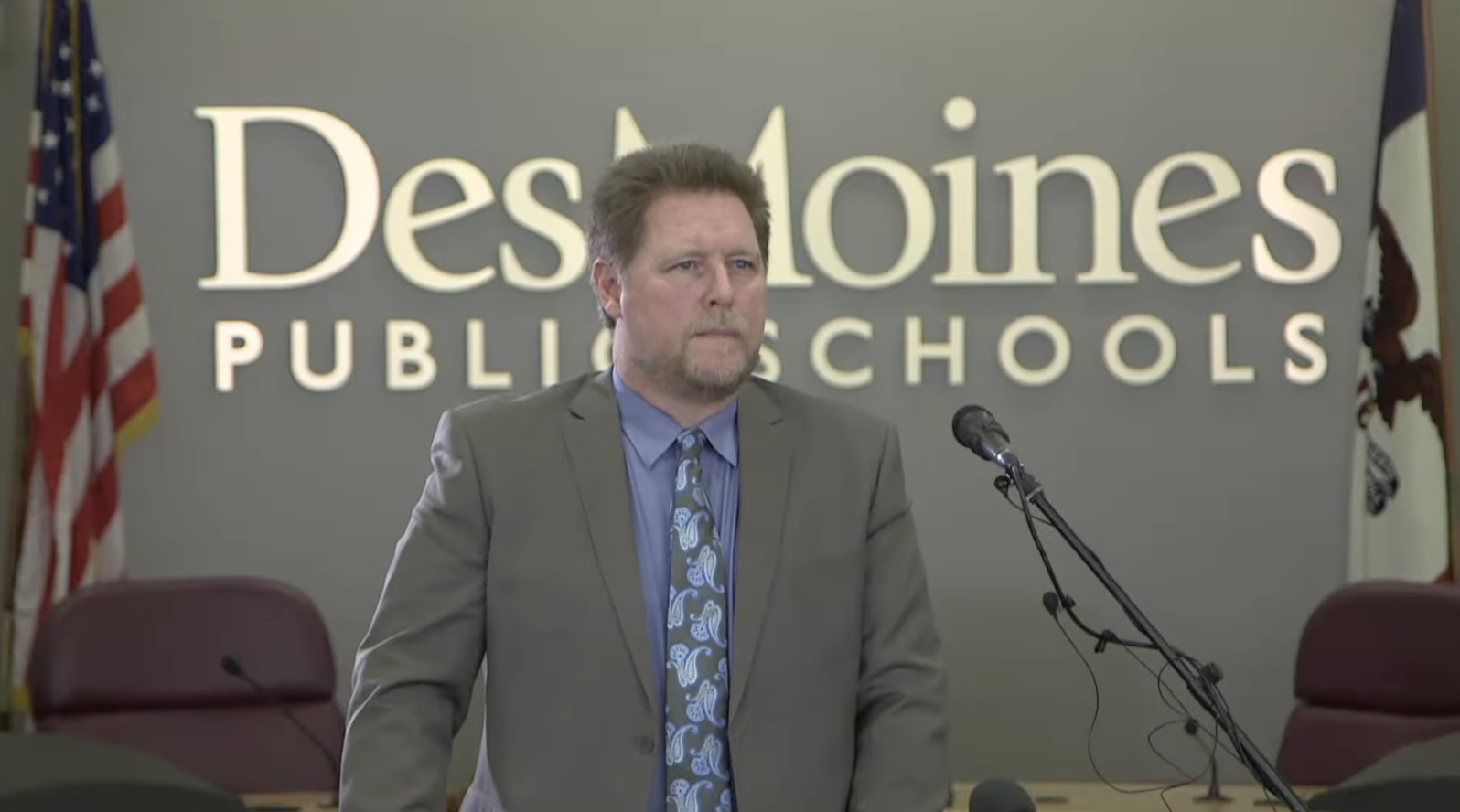Critics of Des Moines school board member Jonathan Narcisse may want to revise their opinions in light of this report published in the Des Moines Register on September 26:
The Des Moines school district should sue the construction management firm that has overseen projects paid for with a local-option sales tax, an attorney hired by the school board recommended in a report released Thursday.
The recommendation came after a year-long review by attorney Nicholas Critelli that showed competitive bidding laws were broken on school construction projects. The violations were in addition to those found in a 2007 state auditor’s report.
The district has a $20 million contract with Taylor Ohde Kitchell to oversee construction projects. The firm is responsible for the violations, Critelli wrote.
Critelli’s report affirmed Auditor David Vaudt’s report that four contracts for work at East High School were split into nine smaller purchase orders. The contracts – $115,362 for an annex and $67,387 for a gymnasium – should have fallen under a state law that requires competition for any project of more than $25,000.
To download a pdf file of Critelli’s report, click here.
Here is an excerpt from an e-mail Jonathan Narcisse sent to his supporters in October 2007, one month after he was elected to the Des Moines school board:
The Taylor Ohde Kitchell contract remains a concern and I am waiting for more specific reports and evaluations. This is a $20+ million contract being paid out of local option tax dollars. One man working for T.O.K., Doug Ohde, was paid $19,200 for his September hours, his total compensation paid for 160 hours of work. Others working for T.O.K. were paid $11,675.36, $10,723.43 and $10,576.48 out of our tax dollars for their September hours.
Our Board Chair Dick Murphy has stated if I want to know what Doug Ohde is doing to earn those tax dollars I should contact the company and ask him, but I prefer to see a performance evaluation by the District and will pursue details. After all, Doug Ohde is being paid more than our Superintendent.
That’s former school board chairman Dick Murphy, who unwisely tried to get his colleagues to censure Narcisse following the latest school board election.
By the way, the Des Moines Register reported that Taylor Ohde Kitchell and Duane Van Hemert, the district’s former facilities manager, “refused to participate” in Critelli’s investigation.
Van Hemert resigned not long after Nancy Sebring replaced Eric Witherspoon as superintendent. For years before that, Narcisse and Nan Stillians of the Save Our Schools organization had been criticizing the Taylor Ohde Kitchell contract and various decisions made by Withersppon and Van Hemert. To get a taste, read this feature on Stillians and Save Our Schools, published in the Des Moines area weekly Cityview in May 2006.
In those days, I used to hear Stillians and Narcisse referred to as “rabble-rousers” or worse, and they did sometimes use intemperate language. However, many of their concerns turned out to be justified. Meanwhile, no one on the Des Moines school board seemed to be asking tough questions during Witherspoon’s tenure as superintendent.
Earlier this month, voters re-elected three incumbents to the Des Moines school board. Narcisse had backed three challengers, Mike Pike, Steve Flood and Kris Crisman. Those challengers raised concerns about Taylor Ohde Kitchell and other aspects of the school district’s management during the campaign. For example, read this campaign flier promoting the candidacies of Flood, Crisman and Pike.
Here is an excerpt from an e-mail Narcisse sent to his mailing list on September 26:
Attached above is a map from the September 9, 2008, election. The pink, orange and yellow precincts were won by Ginny Strong, Jeanette Woods and Dick Murphy. The dark blue precincts were won by Mike Pike and Steve Flood. Mike Pike captured the most precincts. Mike Pike, Steve Flood and Kris Crisman finished first, second and fourth in the two Eastside wards and Pleasant Hill.
If this Des Moines School District election had operated under a Ward system, voters of these precincts would have gained meaningful representation on the Des Moines School Board. Instead, between 10-15 precincts on the west side continue to control the outcome of Des Moines school board contests. Below are a few examples of the disparity between how we on the DMPS board treat Eastside schools compared to how we treat Westside schools.
* Prominent Westside schools like Greenwood, Hannawalt, and Hubbell were not consolidated and were moved to the head of line for local option tax money, while the Eastside saw super-sized elementary schools like Brubaker with 700 students, and Adams closed, despite strong and prolonged protests and a legal appeal still in process before the Iowa Supreme Court.
* The District spent $11,148 per pupil on our 4th most affluent non-choice elementary Walnut Street school; while we spent $6,738 –or $4,410 less per pupil –at our poorest school Willard on the Eastside where 93.46% of students receive free or reduced-fee lunches. The District spent more money per pupil at Merrill than at Weeks, despite Weeks containing twice as many students living in poverty as those at Merrill so defined.
* The Eastside showed exceptional support for re-opening a full-time Technical/Vocational school; however, the District plans to invest more to expand programming in Westside students through the prestigious I.B. [international baccalaureate] program.
I still believe that it is a mistake to interpret the recent school board election as a sign that voters are happy with the status quo in Des Moines public schools. I believe that many people supported the incumbents because they feared the challengers would give the religious right a foothold on the school board.
I support switching to a ward system for school board elections in Des Moines, so people on the east side do not continue to feel disenfranchised by the process.
Whether or not that reform is enacted, it is important for school board members to keep a close watch on administrators so that abuses like those uncovered in Critelli’s report do not happen again.
Final note: This article from the Des Moines Register troubles me:
A consultant charged $36,000 to teach Des Moines school board members how to monitor Superintendent Nancy Sebring’s job performance under a new management method that wraps up its first year next month.
Up to another $22,000 is budgeted – the money also can be used for conference fees and subscriptions – to help board members understand the so-called “policy governance” model, which gives them the authority to set broad goals but grants Sebring and top administrators the power to decide how those directives are met. Sebring, for example, would decide which schools hire additional kindergarten teachers if board members decided that smaller classes sizes are needed.
The district hired James Hyatt of Charney Associates in January 2007 to teach the model, which is derived from the way corporate boards of directors oversee their chief executive officers. The district hopes to get a $15,000 grant to help pay for Hyatt’s work.
The method has critics, who say it gives the superintendent leeway to make important decisions that are not immediately made public.
Sebring seems like a good superintendent, but the last thing the Des Moines school district needs is for school board members to become less engaged in how the district is managed.
Continue Reading...




